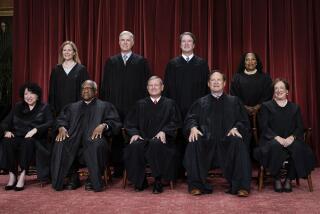House Ethics Committee to Probe Wright : Will Examine Charges Speaker Used Office for Personal Gain
WASHINGTON — The House Ethics Committee announced Friday it will conduct an official inquiry into accusations that Speaker Jim Wright violated House conflict-of-interest rules in his financial dealings.
Committee Chairman Julian C. Dixon (D-Los Angeles) said the panel--six Democrats and six Republicans--unanimously approved “a preliminary inquiry in the matter of Speaker James Wright.”
“The Speaker of the House has been notified and has pledged his full cooperation,” he said.
Goal to Be Good Servant
Wright proclaimed his innocence and denied using his office for personal gain. “My goal, and just about my only professional goal in living at this point, is to be a good and effective public servant,” he said in a statement.
It was only the second time since the Ethics Committee was created 21 years ago that it has investigated a Speaker of the House. Former Speaker Thomas P. (Tip) O’Neill Jr. (D-Mass.) was investigated and cleared as part of the Korean influence scandal a decade ago.
Wright, accompanied by his lawyer, met with reporters for nearly two hours before the committee announcement, answering questions and providing papers he said refuted the charges against him.
The Texas Democrat repeated his assertion that his troubles were the result of Republicans seeking to deflect charges of sleaze in the Reagan Administration.
‘Politically Motivated’
“I don’t think there’s any question but that they’re politically motivated,” he said of the accusations. Although Republicans would still be critical even if they were not themselves under attack, “I don’t think there would have been a formal charge and all this fanfare,” he said.
The committee listed six areas in which “actions taken by House Speaker James C. Wright Jr. . . . may have resulted in violations of the Code of Official Conduct, or a law, rule, regulation or other standard of conduct:”
- The circumstances surrounding lobbying efforts for a friend and constituent, Richard Moncrief, with whom Wright had an interest in a private gas well venture.
- The circumstances surrounding Wright’s intervention on behalf of Texas Oil & Gas Co. in a matter before the Interior Department.
- Whether campaign funds were used to help pay for publication of Wright’s book, “Reflections of a Public Man,” from which he received a 55% royalty totaling about $55,000.
- Whether Wright improperly assigned a congressional aide and used his office expense accounts to complete work on the book.
- Wright’s use of a condominium in Fort Worth, Tex., which belonged to a son of his friend and business partner George Mallick, for which Wright reportedly paid a per diem and expenses but no monthly rent.
- The possible exercise of undue influence in dealings with officials of the Federal Home Loan Bank Board on behalf of Texas savings and loan institutions.
The committee went beyond the scope of inquiry suggested by Rep. Newt Gingrich (R-Ga.), who filed the official complaint against the Speaker.
Gingrich had cited the book contract and the oil company dealings. Common Cause, a group that advocates tighter government ethics, asked for an investigation of Wright’s activities on behalf of the bankers.
Gingrich said he was pleased with the Ethics Committee’s decision.
‘Good for the House’
“I think it’s good for the country, I think it’s good for the House as an institution . . . that 12 members, on a bipartisan basis, have voted to investigate the Speaker,” Gingrich said.
Wright’s lawyer, William Oldaker, said he thinks the committee--known officially as the Committee on Standards of Official Conduct--had no need for an outside counsel, as Gingrich had suggested. Oldaker expressed confidence the Speaker would be exonerated.
The decision to launch a preliminary inquiry was the normal procedure when a member presented a case that could, if true, constitute a violation, Oldaker said.
The committee has the power to bring charges before the full House that can result in disciplinary action, the most rare and severe of which would be expulsion.
Wright had been largely unavailable to discuss details of the accusations until Friday, when he launched what appeared to be an all-out effort that included lengthy interviews with print and broadcast reporters.
Statement on Condominium
He also released a 23-page statement, along with documents he said supported, point by point, his claims he had done nothing wrong. After the committee announcement, the Speaker’s office released an additional statement regarding the condominium.
The Speaker said he had no financial interest in the oil company cases, which date from the late 1970s. His efforts included giving a letter to the late Egyptian President Anwar Sadat.
Intervention on behalf of failing Texas savings and loan institutions, he said, was “in the nature of my duties as Speaker.” He had merely asked regulators to hear the cases of his constituents, he said, and published reports implying anything else were “just pure fiction.”
Wright defended his book deal, denying that he was given the high royalties as a return from the nearly $300,000 in business his campaigns had given the company owned by the publisher, his friend William Carlos Moore.
“There’s nothing wrong with the arrangement to publish the book,” he said.
He also insisted that the staff member who worked on the project did so as a volunteer, and that taxpayers received full value when they financed the employee’s trip to Fort Worth for the project.
Regarding the condominium, which Wright subsequently purchased for $58,500, Wright said the owner had no interest in legislation and that if he had not used it it would have remained vacant.
“To the degree I have ever, or may have erred . . . it would be a mistake of the head, not a mistake of the heart,” he said.
More to Read
Get the L.A. Times Politics newsletter
Deeply reported insights into legislation, politics and policy from Sacramento, Washington and beyond. In your inbox three times per week.
You may occasionally receive promotional content from the Los Angeles Times.










